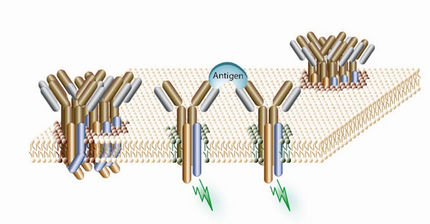Allergies through ozone effects?
Ozone increases allergen load
ozone affects pollen allergens: at ozone levels typical of photochemical smog, more allergens are formed in pollen. This connection has been demonstrated in the rye plant and is now being published in the Journal of Allergy Clinical immunology. The project funded by the Austrian Science Fund FWF shows that elevated ozone levels during maturation increase the protein and allergen contents of rye pollen. This points to a relationship between current environmental problems due to climate change and the rise in allergies.
It's on everyone's lips, especially during the summer months when photochemical smog engulfs the world's cities. Environmental pollution and climate change both contribute to the increasingly frequent incidences observed. While this is a major health problem in itself, there are now indications that elevated ozone levels also raise the allergen content of pollen. A team from the Medical University of Vienna and the Austrian Institute of Technology have investigated the reasons for this phenomenon.
The team behind project leader Prof. Rudolf Valenta of the Centre for Pathophysiology, Infectiology and Immunology at the Medical University of Vienna cultivated two different rye cultivars under controlled environmental conditions. One group of plants was exposed to elevated ozone concentrations (79 parts per billion) for part of the time. This value is more than three times the normal ozone concentration at ground level, i.e. 22 ppb, and corresponds to the health-endangering peak values that occur on hot days in Vienna. A control group was grown at normal ozone levels for subsequent comparison with the high-ozone group.
When the pollen was mature, it was harvested and collected for further study. It yielded very convincing results, as Prof. Valenta explains: "First, we were able to show that the higher ozone concentrations led to a marked elevation of the protein content in both cultivars. Further analysis showed that allergens of groups 1, 5 and 6 contribute to this increase, as does another allergen, profilin. Even in the second rye cultivar, increased ozone exposure during pollen maturation led to a sharp rise in group 1 allergens and profilin."
This result alone would seem to show that higher ozone levels can increase the allergic potential of certain grasses. However, "more allergens" does not necessarily translate to "more allergies". It was clear to Prof. Valenta and his team that potential allergens are not always recognized by the immune system and therefore do not always give rise to allergies. "A study from 2007 shows that ozone can actually decrease the allergenicity of rye allergens , comments Prof. Valenta. "So there may be more allergens, as our work shows, but whether these would react with human IgE antibodies and cause actual allergies was not clear."
However, another experiment soon provided a clear answer to this question: protein extracts from both rye cultivars were incubated with IgE antibodies from allergic patients. The results showed that the protein extracts from ozone-stressed plants reacted more strongly with the IgE antibodies, which are involved in allergic reactions, than those of the control plants, meaning that the former are more allergenic.
Consequently, the team around Prof. Valenta, Dr. Thomas Reichenauer and Prof. Verena Niederberger, managed to demonstrate in this FWF-funded project in a well controlled set of experiments that environmental problems such as rising ozone concentrations at ground level may bear some of the responsibility for the constant increase in allergic disorders in our society in recent years.
Original publication: J. Eckl-Dorna, B. Klein, T.G. Reichenauer, V. Niederberger, R. Valenta; "Exposure of rye (Secale cereale) cultivars to elevated ozone levels increases the allergen content in pollen"; J Allergy Clin Immunol. 2010.
Other news from the department science
Most read news
More news from our other portals
See the theme worlds for related content
Topic world Antibodies
Antibodies are specialized molecules of our immune system that can specifically recognize and neutralize pathogens or foreign substances. Antibody research in biotech and pharma has recognized this natural defense potential and is working intensively to make it therapeutically useful. From monoclonal antibodies used against cancer or autoimmune diseases to antibody-drug conjugates that specifically transport drugs to disease cells - the possibilities are enormous

Topic world Antibodies
Antibodies are specialized molecules of our immune system that can specifically recognize and neutralize pathogens or foreign substances. Antibody research in biotech and pharma has recognized this natural defense potential and is working intensively to make it therapeutically useful. From monoclonal antibodies used against cancer or autoimmune diseases to antibody-drug conjugates that specifically transport drugs to disease cells - the possibilities are enormous



















































